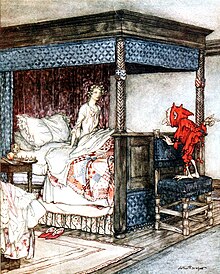Billy Blind (also known as Billy Blin, Billy Blynde, Billie Blin, or Belly Blin) is an English and Lowland Scottish household spirit, much like a brownie. He appears only in ballads, where he frequently advises the characters.[1] It is possible that the character of Billy Blind is a folk memory of the god Woden or Odin from Germanic mythology, in his "more playful aspect" [2][3][4][5][6][7][8][9][10] and is speculated to have been the same character as Blind Harie, the "blind man of the game" in Scotland.[8]

In Child Ballads
edit- Gil Brenton (no. 5c). Billy Blind advises the hero that the latter's bride is not the woman laying beside him (who is a virgin) . The bride is hiding in her bower and already pregnant.[11]
- Willie's Lady no. 6), Willie's wife has been in labour and cannot deliver because Willie's mother, a rank witch, is preventing her. Billy Blind advises Willie to make a wax figure of a baby and invite his mother to the christening. In her rage, the mother demands to know how all her magic was undone, listing all the things she's done, and Willie is able to undo them.[12]
- Young Bekie (no. 53C). He advises Burd Isobel that Young Bekie is about to marry another bride, and gives her assistance in the magical journey to reach him in time.[13]
- The Knight and the Shepherd's Daughter (no. 110). He appears in many of the variants to reveal the true births of the marrying couple: much higher than was apparent.[14]
Modern depictions
edit- In modern fantasy, Billy Blind appears in Peter S. Beagle's Tamsin (1999), in which his main characteristic is to give advice.
- In the British TV Series Renegade Nell (2023) about highwaywoman Nell in 18th century England, Billy Blind, played by Nick Mohammed, appears as a fictional fairy based on the same name character, and gives advice to Nell.
References
edit- ^ Katharine Briggs, An Encyclopedia of Fairies, Hobgoblins, Brownies, Bogies, and Other Supernatural Creatures, "Billy Blind", p 23. ISBN 0-394-73467-X
- ^ "The Review of English studies, Volumes 7-8", Clarendon Press, 1956.
- ^ "Mythical bards and The life of William Wallace", William Henry Schofield, Harvard University Press, 1920
- ^ "Scottish fairy belief: a history",Lizanne Henderson, Edward J. Cowan, Dundurn Press Ltd., 2001, ISBN 1-86232-190-6, ISBN 978-1-86232-190-8, p.49
- ^ "The English and Scottish Popular Ballads", Francis James Child, Courier Dover Publications, 2003, ISBN 0-486-43145-2, ISBN 978-0-486-43145-1, p.67
- ^ In Search of Lost Gods: A Guide To British Folklore Ralph Whitlock, Phaidon, 1979, p. 160
- ^ "Living With Ballads" Willa Muir, Oxford University Press, 1965
- ^ a b "The Critic, Volume 21" Carolyn Shipman, Charles Waddell Chesnutt, The Critic Printing and Pub. Co., 1894, page 435
- ^ "The American-Scandinavian review, Volume 8" Henry Goddard Leach, American-Scandinavian Foundation., 1920
- ^ "Games and songs of American children, collected and compared" W.W. Newell, 1883
- ^ Francis James Child, English and Scottish Popular Ballads, "Gil Brenton"
- ^ Francis James Child, English and Scottish Popular Ballads, "Willie's Lady"
- ^ Francis James Child, English and Scottish Popular Ballads, "Young Beichan"
- ^ Francis James Child, English and Scottish Popular Ballads, "The Knight and the Shepherd’s Daughter"
External links
edit- Young Bekie (third version)